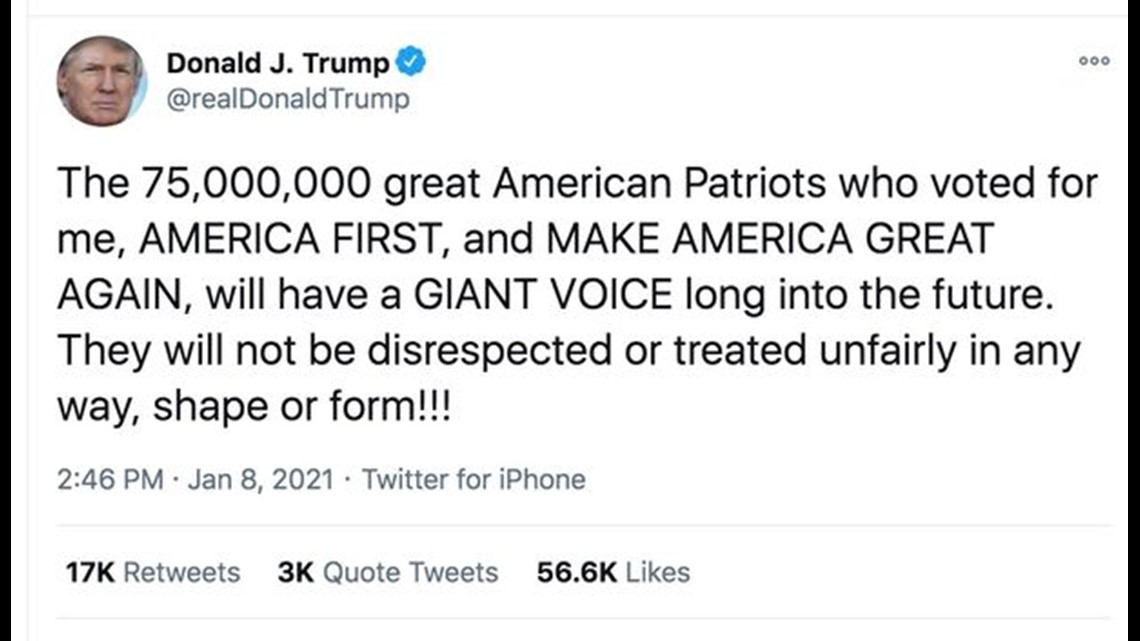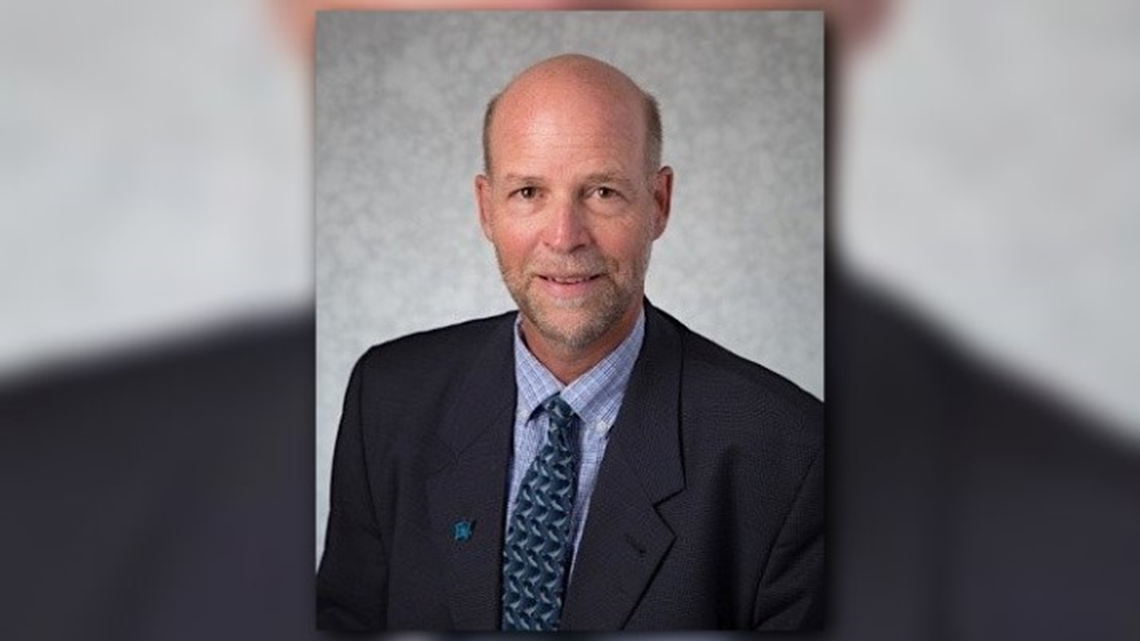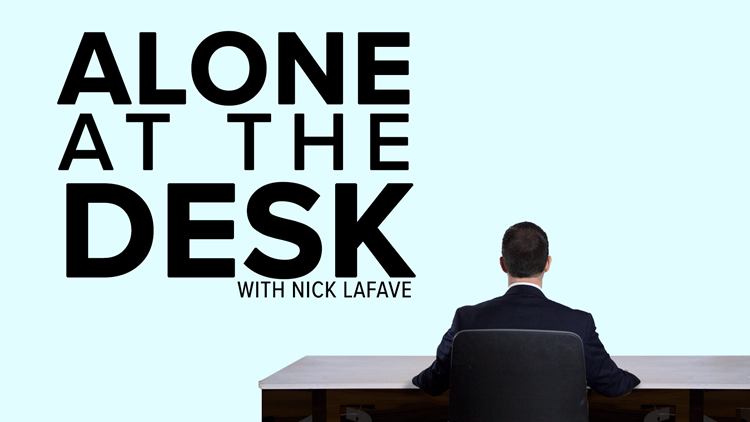GRAND RAPIDS, Mich. — On January 6th, 2021, thousands of Donald Trump supporters stormed the U-S Capital. They broke through windows. They attacked and hospitalized police officers. They beat one with an American flag. One insurrectionist was shot and killed by law enforcement as she tried climbing into the House chamber. The attack came after months of lies from then-President Trump and his supporters claiming that Joe Biden stole the election. He didn't. On December 19th, Trump tweeted, "Big protest in D.C. on January 6th. Be there, will be wild!" The day of the attack, Trump held a rally not far from the U-S Capitol where lawmakers were certifying Biden as the winner.
As the violence was taking place, Trump went onto twitter. Instead of asking for calm, he tweeted, "The 75,000,000 great American Patriots who voted for me, AMERICA FIRST, and MAKE AMERICA GREAT AGAIN, will have a GIANT VOICE long into the future. They will not be disrespected or treated unfairly in any way, shape or form!!!"


After immense pressure to speak out against the violence, trump eventually made a video, in which told the insurrectionists to go home, but that the election was stolen and they were 'very special people' and that he loved them. The social media platforms had enough. That video and his tweets were pulled. His accounts were shut down and remain so to this day.
Twitter put out a statement that said, "After close review of recent Tweets from the @realDonaldTrump account and the context around them we have permanently suspended the account due to the risk of further incitement of violence."
Twitter and Snapchat say he's done for good. And in a statement put out the afternoon of this podcasts publication, Facebook said Trump's account will be shutdown for two years... until January 6, 2023. The impact has been substantial. Zignal Labs - a California-based research firm - showed that - in the immediate days after Trump's banishment, misinformation about election fraud went down a whopping 73%. On the flip side, Data compiled by NewsWhip shows social media interactions about Trump are down 91% from January 6th (when he was booted) to May 3rd.
The power these social media platforms have to remove someone from their platforms has raised a lot of questions and a lot of anger - particularly from the right side of the political spectrum, who feel they are being targeted unfairly. They claim their First Amendment rights are being violated. There's even a new law in one state to stop social media sites from de-platforming politicians. But, is this a First Amendment issue? Is it an ethical issue? Is it a larger problem with the way in which we a society now choose to dialogue with one another? In today's episode we talk with a Constitutional law expert... and a social media expert. Both will give us their thoughts on what's happening... what it means... and where we may be going from here. I'm Nick LaFave. This is Alone At The Desk.
This is Alone At The Desk with Nick LaFave. A podcast by an average, middle aged guy who just happens to be a TV news anchor. We talk exciting and the boring parts of life, the industry, and life in the industry. And we cover some important stories along the way. Brought to you by 13 On Your Side News in Grand Rapids, Michigan.
If you mention the First Amendment to someone, most have a general idea of what it says. They think it means you have freedom of speech and freedom of religion. Beyond that, it can get a bit murky. There are actually five points in that Amendment, including religion, the press, peaceable assembly, and petitioning to the government for a redress of grievances.
SCHINDLER "But the core that we spend most of our time talking about freedom of speech, the idea that Congress will pass no law restricting the freedom of speech."
This is retired Constitutional Law professor Devin Schindler.


SCHINDLER: "Now, the first thing that jumped out at you. Firstly, it says Congress. What about the states, what about local municipalities? The court has ruled over the years that 'Congress' really means government. It's called the process of corporation. So the first thing we have to do is take out the word Congress and put in the word government. So at a broad stroke basis, it stands for the proposition that government cannot unreasonably restrict speech."
We'll get to the big about "Congress" meaning "government" in a minute. First... most people don't stop to realize that every right we have has limits. We have the right to drive. But that can be taken away if you break the law often enough. Even our right to live can be taken away with the death penalty. Schindler says it's the same with speech - even though the First Amendment says "Congress shall make no law."
SCHINDLER: "If you read that literally, government couldn't do things like ban child pornography, cause that's a form of speech, if you wrote that literally government banned things like incitement; fighting words. So again, pretty early on in our constitution, District Court said "well, when the Constitution said no law, it didn't really mean no law, government needs some ability to regulate speech in order to have a civilized society. We don't want to live in a society where child pornography is allowed." So over the decades, there's been this constant balancing act between the desires of the founders to prevent government from restricting free speech, and the needs of running a civil society, which has led to a number of compromises, and some very, very unique holdings. It is a sui generis incredibly important complicated area of Constitutional law."
Back to "Congress" shall make no law meaning "government" shall make no laws. Because already one state has taken action against social media sites banning or limiting politicians. On May 24th, Florida Governor Ron DeSantis - a staunch ally of Trump's - signed a bill into law that would severely penalize platforms like Twitter and Facebook for de-platforming elected officials, and candidates in the state. Remember, Former President Trump's new permanent home is Mara Lago. Social media sites could be fined up to 250-thousand dollars per day for violating the law.
LAFAVE: "Okay, so here's the brass tacks question: is Facebook and or Twitter violating someone's free speech rights when they limit or ban them from posting, in your opinion?
SCHINDLER: "Categorically no. Because of that first word Congress shall make no law. the First Amendment and the Bill of Rights only restrict actions by the government. The government has to take an action of some form or other for the first amendment to even be implicated. Facebook, Twitter, the various social media outlets that are out there are non governmental. Therefore they are not subject to the First Amendment."
But, historically, there are different opinions on that distinction. Including those currently sitting on the Supreme Court.
SCHINDLER: "Well, it goes all the way back to a famous justice by the name of Justice Black who said, We the court shouldn't be balancing free speech against government, because the founders already did the balance wars. They wrote the words no law. And so, I would call those first amendment absolutists, the idea that the First Amendment means what it says, it's more of a textual approach looking at the text of the document, and the balance has already been done by the Founders, so that the court should not be in the business of creating new forms of unprotected speech, shouldn't be in the business of upholding laws that restrict speech, because the Constitution says what it says. There are also one jurist in particular Justice Thomas, who has argued that the First Amendment does not apply to the states that the states are free to do whatever they want to in terms of restricting speech. It simply acts as a limit on Congress."
Schindler says there also one wild card currently on the bench. Trump nominee Neal Gorsuch, who's written a number of opinions that take what Schindler calls a very absolute, textualist approach.
SCHINDLER: "The document says what it says, move on. What's, what he's going to do about the First Amendment is not entirely clear because there hasn't been a big First Amendment case that really goes to that issue yet. but certainly as we see the court becoming... I hate to say the word rightward leaning, you know I don't like that phraseology, but let's just say as it becomes more and more textualist judges on it, more originalist justices... It's entirely possible that we are going to see fewer First Amendment protections as time goes on."
There's another angle to this lawsuit. Generally, when people think of the First Amendment, they think that they can say what they want. In this case... government - specifically Florida - is telling these private companies that they must carry speech. They must allow the ideas and words of all politicians to be disseminated through their platforms. Schindler says that brings up the Forced Speech Doctrine. Coincidentally, also something that came to light from a case in Florida.
SCHINDLER: "Well Isn't it curious that that happened in Florida, given that the leading case in this area, Miami Herald, came from Florida. Let me tell you about the Miami Herald case. Back in the day there was a statute in Florida, of course, that said if a newspaper publishes an article critical of a politician, they had to give the politician the same amount of space in the same location to reply. So if I wrote an editorial criticizing President Biden, the newspaper had to give President Biden equal space to respond. And the idea was fairness, and we want all voices to be heard, and all this sort of thing. The court struck that law down in basically record time, saying, You can't force people to speak. It's called the force speech doctrine... that government cannot, you have a right under the First Amendment, not only to speak and to express your opinions, but you also have the right to not associate with opinions with which you disagree. So if I'm a mall owner and I decided to let feed the whales and save the whales in to, you know, hand out brochures and raise a little money in my mall... I don't have to let in next week the Let's kill all the whales. terrible analogy, but you get the point. I get to pick and choose the ideas with whom I agree. You can't require... If I'm a strong social warrior and My business is very socially conscious, You can't force me to allow the KKK."
LAFAVE: "Sorry, given what you said earlier though about judges like Thomas... Is this not the exact type of case that you think might go up before the High Court at some point?"
SCHINDLER: "I don't see any real desire, on this particular court, to get rid of the speech doctrine, because it plays into the current bakers candlestick makers and marriage equality in marriage cases. because this argument that I should not be forced to associate with ideas with which I disagree is driving a lot of those cases I should not be forced to make a - you know - Larry and David get married cake because I'm a homophobe. Because it's forcing me to express an idea with which I disagree. And the court has shown - we don't have a case directly on point yet - but the court has basically shown that, yeah, that that argument has some traction still. So there's this odd connection here between those cases."
Ultimately, Schindler doesn't see the new Florida law surviving.
SCHINDLER: "I don't not under the Miami, Miami Herald precedent. It. I think it's pure politics. Unless the court throws real curveball at me. And I have to say, Nick, in all honesty, I'm not betting 95% anymore in my fantasy league, my Supreme Court fantasy. So my batting average is down a bit. I will, full disclosure. But this principle of no forced speech has been with us for so long, and is so heavily ingrained, and a lot of cases depend on this notion. And it makes sense to, you know, again, your station shouldn't be forced to take ads, it doesn't want to take."
So, let's pause here and assume for a moment that Schindler and the late Justice Black are right. Facebook and Twitter and all other social media platforms can legally ban, limit or de-platform whomever violates their terms of service. Is it still the right thing to do? Is it the ethical thing to do?
PENNING: "That's a good question."
This is Dr. Timothy Penning. He's a professor of Public Relations and Marketing in the Grand Valley State University School of Communication. And - full disclosure - was one of my professors in masters program. He says banning people depends on the content of what they're saying.


PENNING: "So the law, we'll talk about that too, a lot of law needs to be content neutral, there needs to be a fairly applied principle. So if somebody is inciting violence, and we've heard those terms recently. if the content could lead to harm to other people, there is an ethical obligation to do no harm and not to facilitate doing harm. What we've seen, though, in my opinion, is you can stretch that ethical principle too far. And in the name of ethics, you are silencing people and it is unethical to squelch someone's voice, even if unpopular. And it's unethical to prejudge."
He brings up the very recent example of Facebook, which at one point started scrubbing all posts that suggested or said COVID 19 was manufactured in a Chinese lab. Science, public opinion, and reporting has now come around to the fact that we just don't know... and it may be a possibility. In fact, the Biden Administration - after stopping a Trump-era investigation into that theory - just started it's own 90 day inquiry.
PENNING: "So they switched in the interim. there was a harm to society in that we did not have a robust discussion of people's opinion, civilly presented rationally articulated, it was just banned. I think that is unethical."
One of the big problems with social media is how fast - not just false information can spread - but dangerously false information. I brought up the example of Pizzagate. I lie was spread around by right wing conspiracy theories like Jack Posobiec that a pedophilia ring was being run by democrats out of a pizza shop in Washington D-C. A man traveled from North Carolina to investigate, and wound up firing a gun inside the restaurant. Thankfully, no one was hurt. But, a conspiracy theory spread on social media and people almost got hurt.
PENNING: "You know, the university, you know, intellectual people we've always been taught and we've lost some of that recently that it doesn't matter if you agree with the opinion. What you need to understand is that the more opinions that come out, if they're bad opinions, they'll die on the vine, right? The problem with social media is we don't have the filter of Professional Journalists like yourself, you could you could interview somebody, and you could show all sides. But the problem now is its unmediated, immediate mass distribution of ridiculous things that are nevertheless believed by large swaths of society. So so that's a new problem we have that complicates things."
Many have pointed out that Trump and other politicians are treated differently - even by Twitters own standards. They feel the public has a right to know what they're saying, sometimes regardless of how ugly or false it is. And platforms struggled with this. Before they banned Trump, they flagged his posts saying they weren't true, or in dispute, or linked to fact checks. But conservatives still don't think these practices were or are currently being applied fairly.
PENNING: "I mean, the argument was the Ayatollah Khomeini was saying Israel should be wiped off the mat, never challenged. I think Justin Trudeau in Canada said something kind of objectionable, and people are saying, you know, that, why that and so there was kind of this very hyper polarized attitudinal basis about Donald Trump that may have led to that, and and people are analyzing what he said. So Maxine Waters comes up a lot. She was never banned. Nancy Pelosi never banned. A lot of people on the left, including some people in media on the left, never banned. So the problem is that becomes fuel for the complaint that conservatives are mistreated. And they largely are. I mean, there there aren't. The media is overwhelmingly liberal. If you look at studies and data of the ideology of reporters, right? Now, there is conservative media emerging. And there are a lot of media that do maintain a pretty good objective tone. But if you're going to ban you have to make it uniformly applicable. I think a better strategy again, john Stuart Mill, let people say, you know, disparaging things, upsetting things and let it die on the vine in the broader public sphere."
It's a similar philosophy mentioned by Schindler.
SCHINDLER: "The underlying theory by a number of jurists by most notably by Justice Holmes, is that the First Amendment protects the marketplace of ideas. The idea that the best search for the truth, is to let it all in and then let people hear all sides of the debate let them hear that nasty stuff. Let them hear stuff they want to hear. And then we the people can take in all the speech including highly offensive speech, and that will help us come to the truth."
So, can these platforms restrict and ban anyone - president's and otherwise - who violated their terms of service. The prevailing thought is yes. But, is it the best way for them to go about it? That's a lot more murky. Even by people who know the law, communication and ethics very well.
PENNING: "Twitter, Facebook, YouTube, others, I think that they should say, You kids play nice. And if we don't, you're getting a time out."
SCHINDLER: "I am an older man, I'm 60 years old. I've been doing this for you know since I was 10 years old, literally, constitutional geek my entire life. Under this 50 years and, you know, I've seen these, this exact debate play out in other realms, but including newspapers, I've seen this same basic fight in the world of broadcast media. Well, now it's time for us to look at the internet. same arguments, same ideas, same solutions which in the case of Miami Herald were unconstitutional solutions to marketplace, let the marketplace find its own level.
This has been Alone At The Desk with Nick LaFave. If you'd like to hear more of our episodes, just go to 13OnYourSide.com/podcasts. You can also find us on iTunes, Soundcloud and Spotify. And you can find me at Twitter.com/nicklafave or Facebook.com/nicknews. And you can email me directly at NickLaFave@13OnYourSide.com. Thanks for listening.
►Make it easy to keep up to date with more stories like this. Download the 13 ON YOUR SIDE app now.
Have a news tip? Email news@13onyourside.com, visit our Facebook page or Twitter. Subscribe to our YouTube channel.



